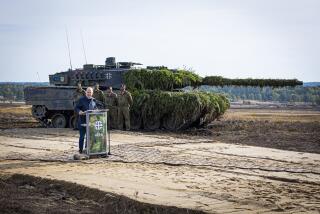Kohl Seeks Wider Role in Operations by U.N. : Germany: Stung by criticism for inactivity in Gulf, Bonn would have to overcome constitutional barriers.
- Share via
BONN — The dust had barely settled over the Persian Gulf War battlefields when Chancellor Helmut Kohl’s government began laying the groundwork for constitutional changes that would permit German forces to play a future role in such United Nations-approved military operations.
Stunned by accusations of cowardice and faintheartedness from some of his close allies--and uncomfortably alone as the only major NATO power not directly involved in military action against Iraq--Kohl and those around him quickly realized that the political price of non-involvement was intolerably high.
Speaking in Parliament earlier this month, Kohl described the need to liberalize the present constitutional interpretation that blocks deployment of German military forces outside the North Atlantic Treaty Organization area as “a touchstone for the seriousness of our political will.”
“It is an issue that affects our international reputation,” admitted a close aide to the chancellor.
Despite the high stakes, pushing through the changes that would allow Germany to react in concert with its allies in an international crisis will not be easy. Indeed, some argue that such expectations are simply unrealistic.
In purely political terms, there is considerable doubt whether the necessary two-thirds majority exists in the German Parliament, or Bundestag, to alter the constitution so that German forces can do more than participate as observers in small U.N. peacekeeping forces--so-called blue helmet operations--such as those in Kashmir, Angola and Cyprus.
Kohl rejects the “blue helmet” solution as insufficient. He wants Germany to be more like any Western democracy. He wants German forces to be able to join a U.N.-approved multinational strike force like the one that defeated Iraq. He also maintains that German troops must be part of joint actions undertaken within the framework of a future European security structure, such as the West European Union.
But winning the needed parliamentary backing to amend the constitution broadly enough to permit this remains uncertain.
Some constitutional change is expected this year.
The German constitution, known as the Basic Law, is worded ambiguously on the point. But a powerful rejection of militarism instilled among the post-World War II generation has led successive governments to follow an interpretation that restricts German forces to the NATO region.
While new responsibilities inherent in last October’s unification and Germany’s isolation from its allies during the Gulf War diluted this conviction to a degree, it remains strong.
“It’s hard to say what the mood in the Bundestag is,” commented a Kohl aide. “But it’s going to be a tough battle.”
While the chancellor can count on strong backing within his own Christian Democrats, the opposition Social Democrats are deeply divided.
Opposition support is vital to achieve the needed two-thirds majority.
The Social Democrats’ party leadership last week moved away from its stringent 1988 policy decision rejecting German military participation in any international operations outside the NATO region--but drew the line at “blue helmet” operations only.
“The consensus position in the party is that ‘blue helmet’ is the limit,” noted Eckhard Luebkemeier, a security policy specialist at the Friedrich Ebert Foundation, a think tank funded by the Social Democrats. “Those who want more will have to struggle for it.”
Some are trying. For example, Norbert Gansel, the Social Democrats’ chief spokesman on foreign and security policy matters, has proposed the creation of specially trained and equipped units of the Bundeswehr, or armed forces. Made up exclusively of volunteers, they could be deployed either for “blue helmet” operations or as part of a U.N.-approved, U.N.-commanded international strike force.
More to Read
Sign up for Essential California
The most important California stories and recommendations in your inbox every morning.
You may occasionally receive promotional content from the Los Angeles Times.










